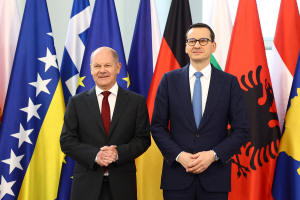Poland election turns Germany into punchbag, straining Western alliance
 Send a link to a friend
Send a link to a friend
 [October 05, 2023]
By Marek Strzelecki, Sabine Siebold and Anna Koper [October 05, 2023]
By Marek Strzelecki, Sabine Siebold and Anna Koper
WARSAW/BERLIN (Reuters) - Fighting to win an unprecedented third term in
office, Poland's nationalist government has seized on a target close to
home: Germany, its NATO ally and biggest trading partner.
In a tight race ahead of Poland's Oct. 15 election, leaders of the
ruling Law and Justice (PiS) party have accused Germany of trying to
dictate Polish government policy from Berlin on anything from migration
to gas.
The feud has frayed Europe's broadly united front supporting Ukraine
against Russia's invasion, shredding a plan for a joint Polish-German
tank repair plant for Kyiv's benefit.
The populist PiS leadership also says Germany is plotting to install the
party's main electoral opponent, the liberal former prime minister
Donald Tusk, back in power.
PiS has tapped into a mistrust towards Germany that still runs high in
part of the electorate, above all elderly conservatives who remember the
devastation of World War Two.
"Do you know where you can read the (opposition's campaign) program? In
German newspapers," Prime Minister Mateusz Morawiecki told a campaign
event.
His party casts Tusk, who said his grandfather was forcibly conscripted
into the Nazi Wehrmacht during World War Two before escaping to the
Allied side, as a German puppet and the "political husband" of former
German chancellor Angela Merkel. A campaign video also mocked Merkel's
successor Olaf Scholz.

Months of spats between the two neighbors have tested the solidarity of
the Western alliance that rallied around Ukraine after the Russian
invasion last year. They have come at a time when other issues,
including the election of a pro-Russian leader in EU member state
Slovakia, are threatening disruption.
IMPACT ON UKRAINE
The quarrel has already impacted efforts to help Ukraine.
In April the defense ministers of Germany and Poland, with a smile and
hug of solidarity, announced the creation of a joint hub in Poland to
repair German-made Leopard tanks damaged in battle in Ukraine.
But the deal quickly collapsed. In another dispute, Warsaw resisted a
German offer to station Patriot missile air defense units in Poland
before eventually agreeing to it.
"It's very unhelpful that Poland, the people from the Law and Justice
Party, continues to criticize Germany in such a harsh public way," U.S.
General Ben Hodges, who commanded U.S. Army forces in Europe in 2014-17,
told Reuters.
"It's unhelpful because it puts strain on the relationship between two
NATO allies, which therefore puts strain on the overall cohesion of
NATO."
The tank plant would have been a joint effort by German manufacturers
Krauss-Maffei Wegmann and Rheinmetall, neither of which responded to a
request for comment, and the Polish defense conglomerate Polska Grupa
Zbrojeniowa (PGZ).
Among the sticking points, one German source said Poland was asking for
too much money for the repair works. Another source, a German diplomat,
said the talks failed partly because German companies were reluctant to
share technical information.

"But it also showed a little bit the same thing we had for the Patriots,
a general mistrust on the part of the Poles and a sort of being in the
habit of treating a partner in a way that is not usual for a partnership
in the EU or in an alliance."
As things stand, PGZ is repairing some Leopard tanks using spare parts
supplied from Germany.
[to top of second column]
|

Germany's Chancellor Olaf Scholz welcomes Poland's Prime Minister
Mateusz Morawiecki for the Western Balkans Summit at the Chancellery
in Berlin, Germany, November 3, 2022. REUTERS/Lisi Niesner

"To some extent, it depended on the speed of action and decisiveness
of the German side. We were negotiating. Unfortunately, we have a
slightly different view of what it should look like," Sebastian
Chwalek, PGZ's CEO, told Reuters.
Other tanks will be repaired elsewhere, "which is maybe a little bit
more costly and maybe a little bit more time consuming but it's
happening anyway," the German diplomat said.
"It's a sign of the present relationship that we cannot agree on
such things."
Polish government officials did not immediately respond to Reuters
requests for comment.
A German Foreign Office spokesperson said Berlin and Warsaw work
closely together on European security and defence but declined
comment on "current domestic political debates in Poland".
SOURING RELATIONS
While ties between Poland and Germany have been frosty since PiS
first came to power in 2015, Poles now see them worsening. Just 47%
think relations are good, according to a German Polish barometer
poll this year, down from 72% in 2020.
Many Poles, included 56% of respondents in the opinion poll, feel
Germany has not done enough to compensate for the damage inflicted
by the war. PiS has called on Germany to pay over 1 trillion euros
in reparations, which Berlin rejected.
A PiS source who requested anonymity described relations as
"competitive", saying Berlin and Warsaw "could work together on many
issues" but others were divisive, including reparations.
Two German lawmakers privately told Reuters that Berlin could have
been more forthcoming in addressing Polish concerns and take
conciliatory steps over the issue of reparations.
"I think we should be looking beyond the cartoonish (Polish policy)
that this (election) campaign has put in front of us. It's the
moment for Germany to look into the mirror," said Thomas
Kleine-Brockhoff of the German Marshall Fund.
Scholz's government has largely brushed off the attacks from PiS. A
government source said Berlin was extra cautious not to even
inadvertently provoke Warsaw.

"We're treading on egg shells," the source said.
To be sure, some analysts believe the Polish rhetoric towards Berlin
could be dialed down after the elections.
But irritants on both sides are likely to persist, including over
migration, which again mushroomed into a flashpoint over a
cash-for-visas scandal in Poland last month.
"Now, to be honest, what I hope will happen is that my president
will invite the two leaders kind of the way he did the leaders from
Japan and South Korea, invited them to Camp David,” Hodges said.
"You know, maybe at some point President (Joe) Biden meets President
(Andrzej) Duda and Chancellor Scholz and says: Fellows, we have got
to fix it."
($1 = 0.9549 euros)
(Reporting by Justyna Pawlak, Marek Strzelecki, Anna Koper, Anna
Wlodarczak-Semczuk, Alan Charlish in Warsaw; Sarah Marsh, Sabine
Siebold and Andreas Rinke in Berlin; writing by Matthias Williams;
editing by Mark Heinrich)
[© 2023 Thomson Reuters. All rights
reserved.]This material
may not be published, broadcast, rewritten or redistributed.
Thompson Reuters is solely responsible for this content. |